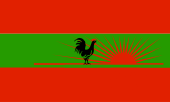UNITA
|
National Union for the Total Independence of Angola
União Nacional para a Independência Total de Angola |
|
|---|---|
| Leader | Isaías Samakuva |
| Founder | Jonas Savimbi, |
| Founded | March 13, 1966 |
| Headquarters | Luanda, Angola |
| Youth wing | Revolutionary United Youth of Angola |
| Women's wing | Angolan Women's League |
| Ideology |
Conservatism Angolan nationalism Christian democracy Maoism (former) |
| Political position |
Right-wing Far-left (former) |
| International affiliation | Centrist Democrat International |
| Seats in the National Assembly |
32 / 220
|
| Party flag | |
 |
|
| Website | |
| unitaangola.org | |
The National Union for the Total Independence of Angola (Unita) (Portuguese: União Nacional para a Independência Total de Angola) is the second-largest political party in Angola. Founded in 1966, Unita fought alongside the Popular Movement for the Liberation of Angola (MPLA) in the Angolan War for Independence (1961–1975) and then against the MPLA in the ensuing civil war (1975–2002). The war was one of the most prominent Cold War proxy wars, with Unita receiving military aid from the United States and South Africa while the MPLA received support from the Soviet Union and its allies.
Unita was led by Jonas Savimbi from its foundation until his death in 2002. His successor as president of Unita is Isaías Samakuva. Following Savimbi's death, Unita abandoned armed struggle and participated in electoral politics. The party won 16 out of 220 seats in the 2008 parliamentary election.
Jonas Savimbi and Antonio da Costa Fernandes founded Unita on March 13, 1966 in Muangai in Moxico province in Portuguese Angola (during the Estado Novo regime). 200 other delegates were present in the event. Unita launched its first attack on Portuguese colonial authorities on December 25, 1966.
Savimbi was originally affiliated with Holden Roberto's National Liberation Front of Angola (FNLA). Unita later moved to Jamba in Angola's southeastern province of Cuando Cubango. Unita's leadership was drawn heavily from Angola's majority Ovimbundu ethnic group and its policies were originally Maoist, perhaps influenced by Savimbi's early training in China. They aimed at rural rights and recognized ethnic divisions. In later years, however, Unita became more aligned with the United States, espousing support for capitalism in Angola.
...
Wikipedia
